Disciple: In Support of Vaccines
Vaccines are the best chance we have of stemming the COVID pandemic
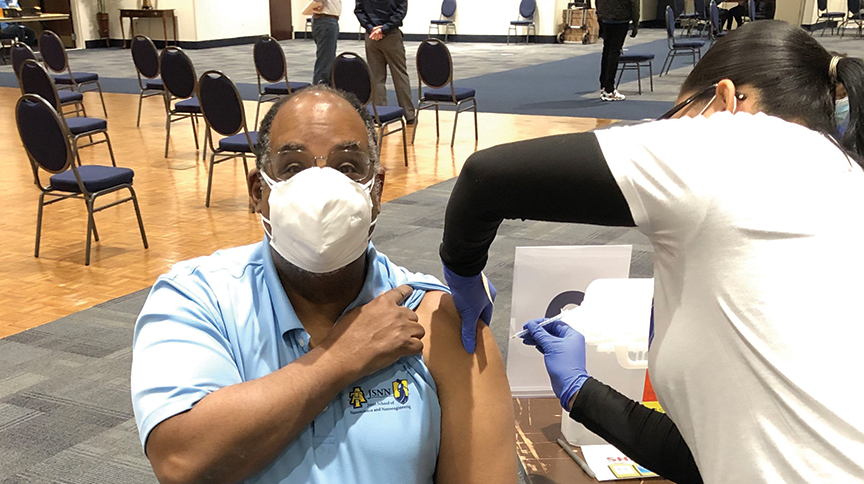 Discussion around vaccines designed to protect us from COVID-19 has understandably dominated the news of late. Unfortunately, along with the promise and encouragement the vaccines hold has come a great deal of misinformation, some of which has made some people pause and consider whether or not to be vaccinated. Asking questions is a good thing, as one’s health is precious and should be considered carefully. The danger lies in trying to make those decisions based on rumor or false information.
Discussion around vaccines designed to protect us from COVID-19 has understandably dominated the news of late. Unfortunately, along with the promise and encouragement the vaccines hold has come a great deal of misinformation, some of which has made some people pause and consider whether or not to be vaccinated. Asking questions is a good thing, as one’s health is precious and should be considered carefully. The danger lies in trying to make those decisions based on rumor or false information.
Enlisting the assistance of medical experts, the Diocese of North Carolina has worked to help parse fact from fiction and aggregate resources with the hope of helping everyone feel safe and confident about taking this most important step toward communal health. Too, we recognize the demonstrable and clear inequity of availability and distribution, so efforts have included helping everyone have access to the vaccine.
From the earliest days of the vaccine rollout, the Rt. Rev. Sam Rodman and the Rt. Rev. Anne Hodges-Copple, bishops of the Diocese of North Carolina, have been steadfast in their support of the vaccine, releasing their first public statement of support in January 2021.
[Image: Dr. Joseph L. Graves. Jr., shared his COVID-19 vaccination photos to demonstrate the safety of the vaccines.]
A MESSAGE FROM THE BISHOPS (JAN. 2021)
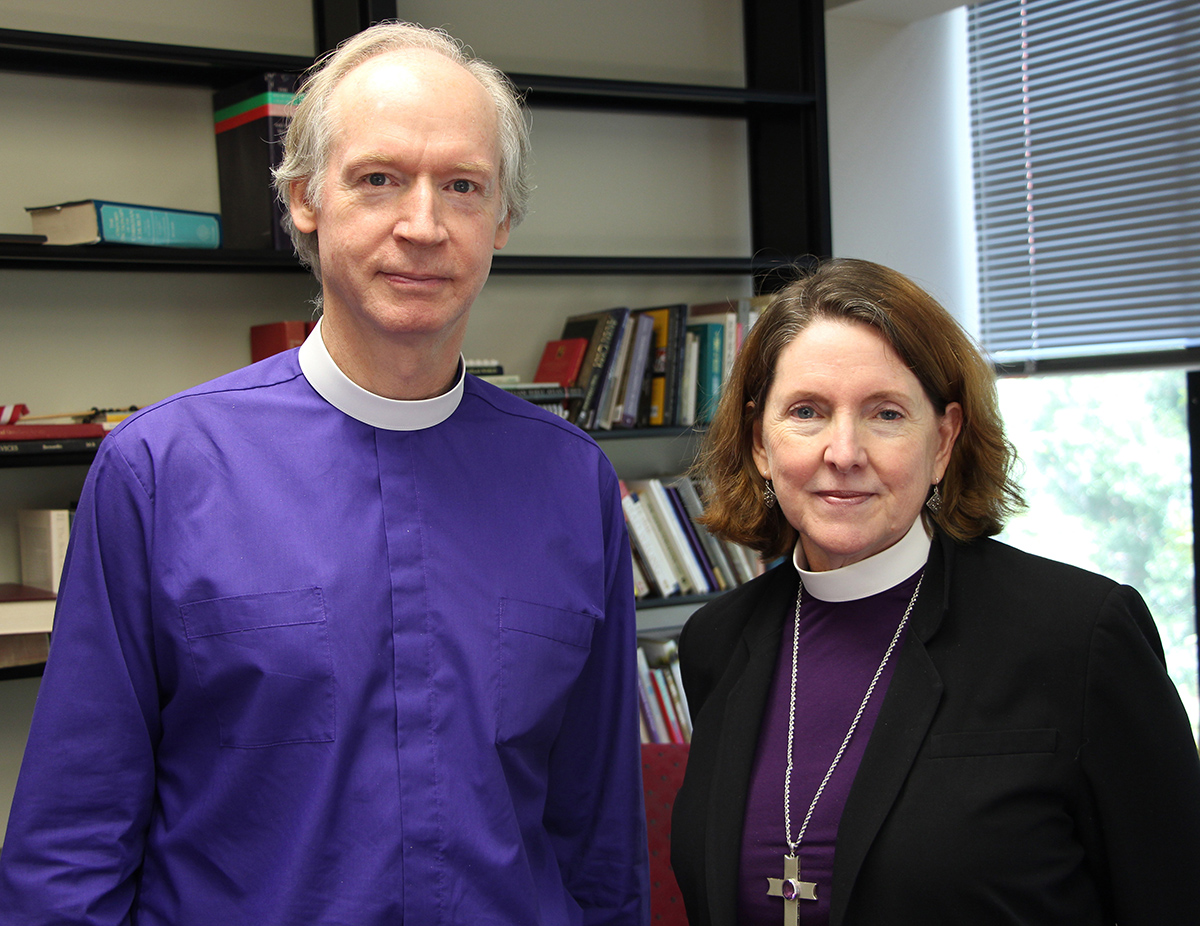 The last 10 months have been a trial for all of us, but the successful development of vaccines for COVID-19 and their approval through rigorous medical trials are reasons for hope.
The last 10 months have been a trial for all of us, but the successful development of vaccines for COVID-19 and their approval through rigorous medical trials are reasons for hope.
With distribution of the vaccines underway, we as your bishops are committed to making reliable information available to all and to doing everything we can to ensure these life-saving vaccines’ equitable and prompt distribution.
[Image: The Rt. Rev. Sam Rodman and the Rt. Rev. Anne Hodges-Copple.]
We now can move closer to a safer way of life and the opportunity eventually to gather together again. That requires action from all of us—vaccinations are what will prevent the spread of COVID-19. Until sufficient numbers of us have been vaccinated to achieve needed levels of immunity, we must remain vigilant about physical distancing, hand washing and mask wearing.
Understanding that some have concerns about the COVID-19 vaccines, we offer these reassurances:
- Vaccines are safe and effective. The Pfizer and Moderna vaccines have each been shown to be more than 90% effective.
- During the last 200 years, vaccination has controlled major communicable diseases, including polio, measles, mumps and rubella. With the exception of the provision of safe water supplies, vaccination has potentially saved more lives than any other medical intervention, including antibiotics.
- Ongoing systemic racism, including in the fields of science and medicine, has left racially subordinated communities understandably concerned about new interventions. Every indication we have is that these vaccines are equally safe for all, and we join with those in health care—medical professionals from these same underserved communities among them—who are urging brown and Black people to be vaccinated as soon as possible.
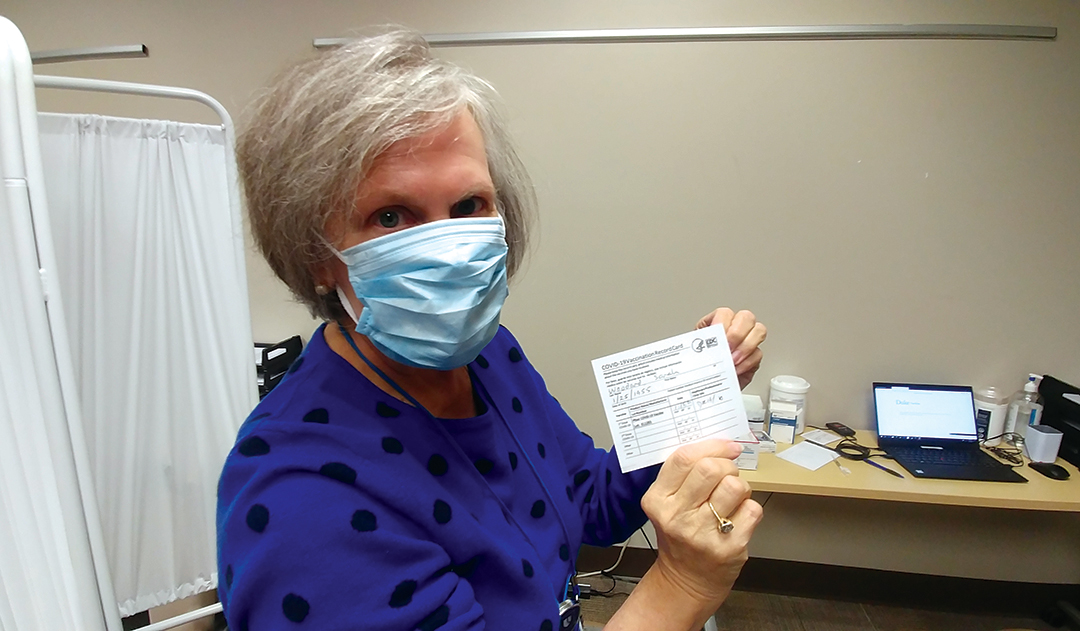 We believe the church can provide significant leadership for communicating and educating about COVID-19 and vaccination. In that spirit, we formed the Diocesan Task Force on Vaccine Education, calling on experienced medical providers, scientists and educators in our diocese who will take the lead in identifying educational resources along with information about access to vaccines in all parts of our diocese. Task force members include:
We believe the church can provide significant leadership for communicating and educating about COVID-19 and vaccination. In that spirit, we formed the Diocesan Task Force on Vaccine Education, calling on experienced medical providers, scientists and educators in our diocese who will take the lead in identifying educational resources along with information about access to vaccines in all parts of our diocese. Task force members include:
- Maureen Flak, parish nurse, public health advocate and task force chair
- The Rev. Scott Balderson, deacon and physician assistant with the Duke Hospital Department of Surgery
- Ann Bauer, epidemiologist and assistant research professor at the UNC School of Medicine
- Dawn Beazer, parish nurse at Holy Spirit and Abundant Life Ministries, Greensboro; registered nurse; and retired nurse practitioner
- Dr. Joseph L. Graves, Jr., professor at NC A&T University; Ph.D. in evolutionary, environmental and systematic biology; and associate director, Triangle Center for Evolutionary Medicine
- Dr. James Horton, physician at Atrium in Charlotte and infectious diseases specialist
- Chris Paul, Ph.D., assistant professor of public administration at NC Central University, and director of the Masters of Public Administration program and health policy specialization
- The Rev. Sallie Simpson, deacon and campus minister at Saint Augustine’s University, and retired nurse
Other diocesan leaders support and supplement their work. We encourage clergy to organize town halls or other educational events to answer parishioners’ questions. For those who wish assistance, the task force has provided resources and access to medical and scientific professionals who are willing to participate in events to answer questions about vaccination.
Two resources currently available from the NC Department of Health and Human Services include a ready-made downloadable slideshow presentation about vaccines and a video library with various voices advocating taking the vaccine. (Diocesan videos with a similar message are also now available.) The New England Journal of Medicine has also compiled an excellent resource addressing frequently asked questions. In addition, a small step each parish can take is to share information about vaccination availability in their county.
We mourn with those in need of comfort, grieving the costs of this pandemic in the loss of more than 500,000 precious children of God, impacts to health that will not be resolved quickly or easily, and lives indefinitely disrupted. We also give thanks to the scientists and health care professionals, farmworkers and grocery store clerks, teachers and other essential workers who sacrificially continue to serve the welfare of us all even at the risk of their well-being.
Let us never forget that we are all in this together. St. Paul writes in the 12th chapter of his First Letter to the Corinthians:
“Just as a body, though one, has many parts, but all its many parts form one body, so it is with Christ. For we were all baptized by one Spirit so as to form one body—whether Jews or Gentiles, slave or free—and we were all given the one Spirit to drink. Even so the body is not made up of one part but of many.”
We may not all be of one mind about vaccination. That’s understandable. But let us be of the same Spirit in seeking not only the welfare of our individual selves, or our own households, but also in seeking the welfare of our wider communities—in fact, the whole global community.
- The Rt. Rev. Sam Rodman and the Rt. Rev. Anne Hodges-Copple
Addressing Concerns
The Diocesan Task Force on Vaccine Education offers answers and resources
The Diocesan Task Force on Vaccine Education spent the early days of its work in conversation with clergy and church leaders to identify the most pressing questions related to the vaccine. The overwhelming concern was availability, with questions about the vaccine itself falling into the broad categories of safety, effectiveness, viability of the collective effort, values and resources.
SAFETY
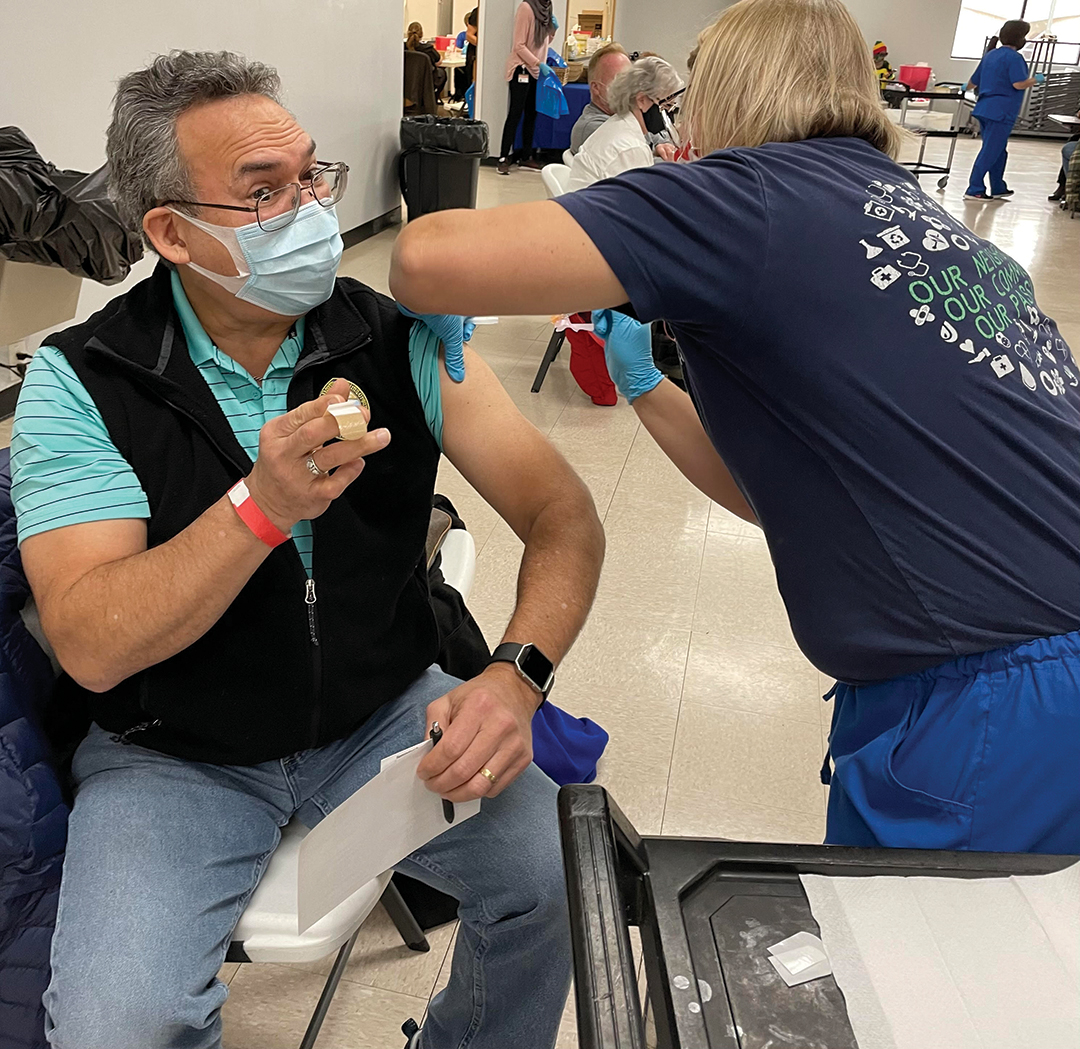
Vaccines have saved more lives than virtually every public health measure other than clean drinking water. The COVID-19 vaccines have been shown to be very safe. The risk of dying from COVID is real and can become much, much worse if we don’t get people vaccinated as soon as possible.
- Vaccines, including the COVID-19 vaccines, are very safe, especially compared to the very serious danger of the disease.
- You cannot get COVID-19 from the vaccines.
- These vaccines are based on decades of research.
- The multiple phases of vaccine trials involved very large numbers (tens of thousands) of people in many countries, including the United States.
- Serious side effects from being vaccinated are very rare. Side effects that do occur generally are mild in the form of soreness and fatigue.
- Allergic reactions to the vaccine are rare and treatable.
- The Moderna and Pfizer vaccines use RNA technologies. These vaccines do not alter your DNA.
- The vaccines produce a protein that trains your immune system to recognize the spike protein of the virus.
- The vaccines contain only the RNA to produce the protein and do not contain any microchips or other means of “tracking” individuals.
EFFECTIVENESS
All of the COVID-19 vaccines have been shown to be very effective at reducing the risk of dying or serious disease (requiring hospitalization) resulting from the virus. You are about 60,000 times more likely to die from COVID-19 than you are to have a serious reaction to the COVID-19 vaccination.
Vaccines are important tools but they cannot end this pandemic by themselves. We must continue with the 3W’s—wear a mask, wash your hands and wait at a distance—to get the spread under control.
- All of the approved COVID-19 vaccines are very effective at reducing risks from COVID-19.
- When combined with distancing, masks and hygiene, vaccines are an extremely important tool in controlling the pandemic.
- The different approved “brands” of the vaccine all achieve a high level of effectiveness, including reducing incidence of the disease, the level of severity and the chance of hospitalization.
- Even though the variants of COVID present new risks, the vaccines retain some effectiveness against them.
- Scientists continue to sequence and develop revised vaccines to respond to the variants.
COLLECTIVE EFFORT
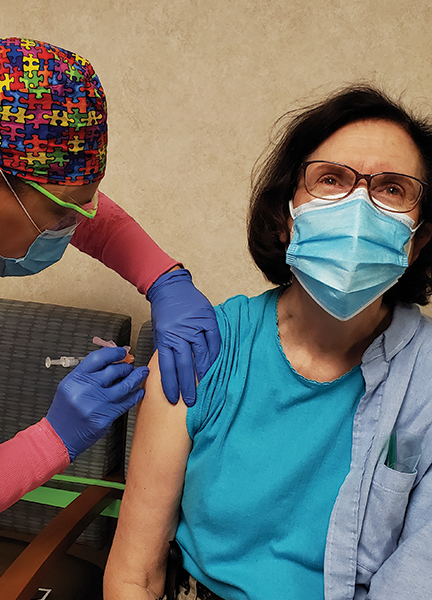 We beat the virus only by banding together. COVID-19 does not discriminate. It will make you sick or kill you regardless of your age, gender, religion or socially defined race. But acting together and deploying the vaccine (with the 3W’s) we can control this pandemic.
We beat the virus only by banding together. COVID-19 does not discriminate. It will make you sick or kill you regardless of your age, gender, religion or socially defined race. But acting together and deploying the vaccine (with the 3W’s) we can control this pandemic.
- All of us who can get a vaccine help reduce the danger of COVID-19 to our entire community, and it gets us closer to being able to gather again.
- Herd immunity requires a supermajority of the population to be vaccinated.
- Mass immunization is part of the strategy to reach herd immunity, in addition to other efforts to reduce transmission.
- The focus of the vaccination effort is to control the pandemic and reduce death and severe disease.
PERSONAL CHOICE AND VALUES
We choose vaccination to protect our families, friends and folks we don’t even know. As the Church, we have to pay special attention to those who cannot advocate for themselves. We must improve access to vaccination to the historically underserved. This is both a morally and a medically sound choice.
- Even once you are vaccinated, it is still possible to contract and transmit the disease, though much less likely.
- It is important to continue the three W’s: Wear, Wait, Wash
- Wear a cloth mask over your nose and mouth.
- Wait six feet apart. Avoid close contact.
- Wash your hands or use hand sanitizer.
RESOURCES AND HELPING OTHERS
If you have specific questions about vaccination and your health, speak to your doctor. The NC Department of Health and Human Services (NCDHHS) has important resources to help answer your questions about health and access to care.
- It is important we and our churches support efforts to get vaccines to those most vulnerable.
- Your doctor and NCDHHS are important resources for specific questions about your health and access to care.
- The vaccine has been prioritized for the highest risk populations, aimed first at exposure to health care workers, reducing the high risk of death in older adults, and then frontline workers (including farmworkers, teachers and clergy).
- Special efforts are being made to make sure all populations, especially minorities, get equitable access to vaccines.
- Compiled by Dr. Joseph L. Graves and Chris Paul, Ph.D.
ADDITIONAL RESOURCES
General Information Resources
- NC Department of Health and Human Services (NCDHHS)
- Center for Disease Control
- Diocese of North Carolina
- Find a Spot to Get Your Shot | 1-888-675-4567
A great resource from NCDHHS is “Find a Spot to Get Your Shot.” With links on the most current information, groups eligible for the vaccine, assistance in finding a vaccination location and a COVID-19 Vaccine Help Center hotline (1-888-675-4567).
*Task Force Tip: If you are able to obtain a spot on a vaccination waitlist, take the spot! This is proving effective at obtaining an appointment.
One-Stop Resources
If you find the amount of information relating to vaccines exhausting, the Diocese of North Carolina has a single link to provide you with general information videos to share with your congregation, access to other shareable materials for social media and bulletins, links to key information sources and more.
How Can You Help?
With the greatest challenges to mass vaccination being the ability to understand the facts about vaccines and to obtain appointments to receive one, there are several ways you can help both your church family and your community neighbors:
- Share the information. Post available videos, and supplement them with your own message.
- Organize informational opportunities. If your congregation or local community still has questions related to the vaccine, offer an online meeting and contact the Diocese to enlist a knowledgeable advocate to come and answer questions.
- Offer to help with appointments.
- If members of your congregation or neighbors do not have access to computers or the confidence to navigate the appointment system, enlist volunteers to take on the task. With just a bit of information, volunteers can make appointments on others’ behalf. If you are serving a community member without an email address or phone number, consider creating a general email address you can monitor for notifications on their behalf. (Just be sure you can reach them if a notification arrives.)
- Similarly, hold times when making appointments by phone can be time some can’t spare. Enlist volunteers to assist with this method of appointment-making as well.
- Sign up to be a vaccination location at bit.ly/BeAVaccinationSite.
- Share your shot. When you get your shot, take a photo and add it to the diocesan Instagram campaign, using the hashtag #GotMyShotNC.
Tags: North Carolina Disciple
